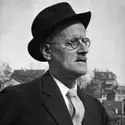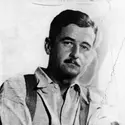POUND EZRA (1885-1972)
Article modifié le
Bibliographie
Œuvres d'Ezra Pound
Poésie : Selected Poems, Londres, New York, 1949
The Cantos, Londres, 1954, rééd. 1964
Section Rock-Drill : 85-95 de los cantares, New York, 1956
Thrones : 96-109 de los cantares, New York, 1959
The Translations of Ezra Pound, H. Kenner éd., New York, 1954, rééd. 1964
Drafts and Fragments of Cantos CX-CXVII, New York, 1968.
Prose : Jefferson and/or Mussolini, Londres, 1935
Polite Essays, Londres, 1937, New York, 1939
The Letters of Ezra Pound, New York, 1950
Patria mia (écrit en 1912), Chicago, 1950, Londres, 1962
Guide to Kulchur, Londres-New York, 1938, rééd. 1952
A B C of Economics, Londres, 1933, rééd. 1953
Litterary Essays, New York, 1954
Gaudier-Brzeska. A Memoir, New York, 1916, rééd. 1960.
Traductions : Cantos et poèmes choisis, trad. R. Laubiès, Paris, 1959
Cantos pisans, trad. D. Roche, Paris, 1965
Textes choisis et présentés par D. de Roux, H. Beaujour et P. Allien, 2 vol., Paris, 1965 et 1966
A B C de la lecture (A B C of Reading, 1934), trad. D. Roche, 1966
Comment lire (How to Read, 1931), trad. V. Liona, Paris, 1966
L'Esprit des lettres romanes (The Spirit of Romance, 1910), trad. P. Allien, 1966
Lettres d'Ezra Pound à James Joyce, trad. P. Lavergne, Paris, 1970
Au cœur du travail poétique, trad. F. Saurey, L'Herne, Paris, 1980
Poèmes, trad. M. Pinson, G. Sartoris et A. Suied, Gallimard, Paris, 1985
Cantos, trad. J. Darras, Y. di Mano, P. Mikriammos, D. Roche, Paris, 1986.
Biographies et études
M. Alexander, The Poetic Achievement of Ezra Pound, Londres, 1979
M. Bacigalupo, The Formed Trace : the Latter Poetry of Ezra Pound, New York, 1979
W. Baumann, The Rose in the Steel Dust, Berne, 1967
I. F. Bell, Critic as Scientist : the Modernist Poetry of Ezra Pound, Methuen, 1981
M. A. Bernstein, The Tale of the Tribe : Ezra Pound and the Modern Verse Epic, Princeton Univ. Press, 1980
C. Brooke-Rose, A ZBC of Ezra Pound, Londres, 1971
R. Bush, The Genesis of Ezra Pound's Cantos, Princeton Univ. Press, 1976
W. M. Chace, The Political Identities of Ezra Pound and T. S. Eliot, Stanford Univ. Press, 1973
J. Cornell, The Trial of Ezra Pound : a Documented Account of the Treason Case by the Defendant's Lawyer, New York, 1966
E. Davis, Vision Fugitive : Ezra Pound and Economics, Univ. Kansas Press, 1969
G. Dekker, Sailing after Knowledge, Londres, 1963
L. S. Dembo, The Confucian Odes of Ezra Pound, a Critical Appraisal, Berkeley, 1963
R. J. Dilligan et al., A Concordance to Ezra Pound's Cantos, Garland Pub., 1981
J. H. Edwards & W. V. Vasse, The Annotated Index to the Cantos I-LXXXIV, Berkeley, 1957
C. Emery, Ideas into Action, a Study of Pound's Cantos, Miami University Press, 1958
J. Espey, Ezra Pound's Mauberley. A Study in Composition, Berkeley, 1955
G. S. Fraser, Ezra Pound, Harlow, 1966
D. Gallup, Ezra Pound : a Bibliography, Univ. Press Virginia, 1983
K. L. Goodwin, The Influence of Ezra Pound, Londres, 1966
S. Hamilton, Ezra Pound and the Symbolist Inheritance, Princeton Univ. Press, 1992
W. Hamon, Time in Ezra Pound's Work, Chapel Hill, 1977
E. Hesse, New Approaches to Ezra Pound, Londres-Berkeley, 1969
C. D. Heymann, Ezra Pound, the Last Rower : a Political Profile, New York, 1976
E. Homberger dir., Ezra Pound : the Critical Heritage, Boston, 1972
P. Hutchins, Ezra Pound's Kensington, Londres, 1965
T. H. Jackson, The Early Poetry of Ezra Pound, Londres, 1969
H. Kenner, The Poetry of Ezra Pound, Londres, 1951 ; The Pound Era, Berkeley, 1971
G. Lane dir., A Concordance to Personae : the Shorter Poems of Ezra Pound, New York, 1972
L. Leary dir., Motive and Method in the Cantos of Ezra Pound, New York, 1954
S. Y. McDougal, Ezra Pound and the Troubadour Tradition, Princeton Univ. Press, 1972
E. C. Mullins, This Difficult Individual, Ezra Pound, New York, 1961
N. C. de Nagy, The Poetry of Ezra Pound : the Pre-Imagist Stage, Bâle, 1960 ; Ezra Pound's Poetics and Literary[...]
La suite de cet article est accessible aux abonnés
- Des contenus variés, complets et fiables
- Accessible sur tous les écrans
- Pas de publicité
Déjà abonné ? Se connecter
Écrit par
- Laurette VÊZA : professeur à l'université de Paris-III
Classification
Média
Autres références
-
LES CANTOS, Ezra Pound - Fiche de lecture
- Écrit par Joël SHAPIRO
- 900 mots
- 1 média
Ezra Pound (1885-1972) demeure l'un des plus grands poètes de notre temps. Il entreprit la rédaction de son grand œuvre, Les Cantos (1954), en 1915. On peut ajouter que, dès 1906, il songeait à un ouvrage épique. Sa biographie nous révèle que le nom de Milton, auteur du Paradis perdu,...
-
ANGLAIS (ART ET CULTURE) - Littérature
- Écrit par Elisabeth ANGEL-PEREZ , Jacques DARRAS , Jean GATTÉGNO , Vanessa GUIGNERY , Christine JORDIS , Ann LECERCLE et Mario PRAZ
- 28 176 mots
- 30 médias
...est en effet tenté de soutenir, sans vouloir cultiver le paradoxe ou la provocation, que les deux grands poètes anglais du siècle sont deux Américains, Ezra Pound et T. S. Eliot. Ezra Pound, venu de l'Idaho à travers Venise et la Provence, conquiert Londres de 1908 à 1920, lance l'imagisme... -
ARNAUD ou ARNAUT DANIEL (actif de 1180 à 1200)
- Écrit par Joël SHAPIRO
- 599 mots
Ezra Pound nous met en garde : « Aucune étude de la poésie européenne ne saurait prétendre au sérieux si elle ne commence tout d'abord par une étude de cet art en Provence », écrit-il. Arnaud Daniel fut certainement, parmi les troubadours, l'un des plus habiles artisans de l'ancien provençal....
-
ÉTATS-UNIS D'AMÉRIQUE (Arts et culture) - La littérature
- Écrit par Marc CHÉNETIER , Rachel ERTEL , Yves-Charles GRANDJEAT , Jean-Pierre MARTIN , Pierre-Yves PÉTILLON , Bernard POLI , Claudine RAYNAUD et Jacques ROUBAUD
- 40 124 mots
- 25 médias
...cas de distances culturelles significatives. La vision de la culture des trois hommes trouve une expression fort variée dans leurs œuvres respectives. Pound, passé le moment imagiste et militant, dépassée l'impasse « vorticiste » de circonstance, bâtit ses Cantos sur un prodigieux florilège... -
IMAGISTES
- Écrit par Henri FLUCHÈRE
- 2 159 mots
- 2 médias
Le terme fut inventé en 1912 parEzra Pound (1885-1972), le poète américain, provisoirement transplanté en Angleterre. Mais la prise de conscience de la doctrine imagiste, et même de l'œuvre imagiste, est difficile à fixer dans le temps. Des poèmes prétendument imagistes avaient vu le jour dès 1908,... - Afficher les 8 références
Voir aussi





